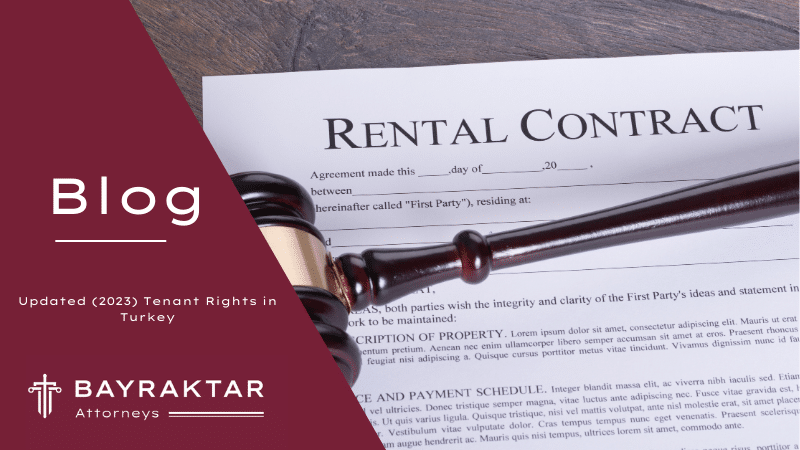
Updated (2023) Tenant Rights in Turkey
The tenant has the right to request that the leased property be delivered in a suitable condition for the intended use as specified in the contract and be maintained in that condition throughout the contract period.
The tenant has the right to request that the mandatory insurance, taxes, and similar obligations related to the leased property be borne by the landlord, unless otherwise agreed or provided for by law.
The tenant has the right to request that the landlord bear the incidental expenses incurred by themselves or a third party related to the use of the leased property.
In the event of significant defects in the leased property, the tenant may invoke the provisions regarding the default of the debtor or the liability of the landlord arising from the subsequent occurrence of defects in the leased property.
In the case of delivery of the leased property with insignificant defects, the tenant may invoke the liability of the landlord for the defects that subsequently arise in the leased property.
If the leased property later becomes defective, the tenant has the right to request the landlord to rectify the defects, make a proportional reduction in the rent amount due to the defects, or compensate for the damages.
In the event of a significant defect, the tenant has the right to terminate the contract.
With the consent of the landlord, the tenant has the right to sublease the property or transfer the lease relationship.
If the tenant provides a deposit as security, the tenant is entitled to receive the deposit back upon the termination of the lease agreement, provided that the property is left in the condition it was rented.
Agreements stating that a penalty clause will be applied or subsequent rent payments will become due in case of late payment of the rent are invalid. Therefore, the making of such agreements shall be prevented.
Except for the determination of the rent amount, no changes that are detrimental to the tenant can be made.
Tenant Rights if the Landlord Sells the Property
According to the Turkish Code of Obligations, when the leased property changes hands, the new owner will be bound by the lease agreement.
Article 310 states that “If the leased property changes hands for any reason after the conclusion of the contract, the new owner becomes a party to the lease agreement.”
The lease agreement continues in the same form and conditions as agreed with the previous landlord. The new owner becomes a party to the lease agreement and takes the place of the landlord. There is no need to make a new contract. If the new owner wants to terminate the lease agreement, they must send a notice to the tenant within 1 month after the transfer of title.
Tenant Rights for a Five-Year Lease
Regardless of whether an agreement has been made between the parties, in lease agreements that are longer than five years or renewed after five years, the rent for the new lease year shall be determined in a fair manner, taking into account the twelve-month average of the consumer price index, the condition of the leased property, and comparable rental prices. The rent amount determined in this way for each subsequent five-year lease year can be changed according to the principles mentioned in the previous paragraphs.
As can be seen, in lease agreements that are longer than five years, the determination of the rent amount can be made in a fair manner by the judge.
Tenant Rights in Urban Transformation
When a decision for urban transformation is made, and if the risky building is demolished, the tenant can receive rental assistance. Rental assistance is determined based on the tenant’s two months’ expenses. Tenants whose buildings are designated for demolition can apply for rental assistance to the Ministry of Environment and Urban Planning Provincial Directorates.
In order to benefit from rental assistance for residential and commercial properties identified as risky by the rights holders, an application must be made to the Directorate/Municipality in the province where the risky structure is located within one year from the eviction date or within three months from the date the risky structure is demolished. For tenants residing in a residential/commercial property, a rental assistance amount determined for the owners in the province where the structure is located will be paid as a lump sum (two months’ rental assistance) at once.
Tenant Rights in Damp Homes
If the rented property has dampness, the tenant can request the elimination of the defect within a reasonable time from the lessor; if the defect is not eliminated during this time, the tenant can deduct the expenses incurred from the rent or request a replacement with a similar property free from defects.
In case the defect eliminates or significantly impedes the intended use of the rented property and is not rectified within the given period, the tenant can terminate the contract.
If there are defects affecting the use of the rented property, the tenant can request a proportional reduction in rent for the period from the time the lessor becomes aware of the defects until the defects are rectified.
Unless the lessor proves otherwise, they are obliged to compensate the tenant for damages arising from the defective condition of the rented property.
Tenant Rights without a Contract
According to the Turkish Code of Obligations, a written lease agreement is not mandatory. With the agreement of the parties, a lease agreement can be made without a contract. Having the lease agreement in writing provides ease of proof. In case of disputes between the parties, having it in writing will be reasonable for both parties in terms of ease of proof.
Since the requirement for a written lease agreement is not mandatory, a lease agreement can still exist even in the absence of a contract. The tenant cannot be unlawfully evicted and cannot be prevented from exercising their rights.
Tenant Rights in Risky Structures
A risky structure is a name given to a building that carries the risk of severe damage or collapse, based on scientific data indicating that its economic life has expired. When a building is identified as a risky structure, the tenants in the building are also notified. The reason for notifying the tenants is that the tenants living in the risky structure will have their lease agreements terminated. The Turkish Code of Obligations, where the lease agreement is regulated, states the following in Article 301: “The lessor is obliged to deliver the rented property in a condition suitable for the intended use on the agreed date and keep it in that condition throughout the term of the contract.”
As seen, the lessor is obliged to keep the rented property in a condition suitable for the intended use throughout the term of the contract. When a risky structure is identified, it is observed that the lessor acts contrary to this provision.
Furthermore, Article 306 of the Turkish Code of Obligations states: “In the event that the defect eliminates or significantly impedes the intended use of the rented property and is not rectified within the given period, the tenant can terminate the contract.” Therefore, if it can be argued that the defect in a risky structure eliminates the suitability for the intended use, the tenant can terminate the contract. When the property you are a tenant of is designated as risky, you can terminate the lease agreement by sending a formal notice to the lessor.
Tenant Rights for Store Rentals
Rental agreements are regulated in three parts in the Turkish Code of Obligations. The first part consists of general provisions and is applicable to areas where there are no specific provisions. The second part covers residential and roofed commercial leases. Since general provisions apply to areas that are not regulated in the section on residential and roofed commercial leases, we will refer to the tenant rights mentioned above.
The tenant rights regulated in the section on residential and roofed commercial leases are as follows:
According to Article 343 of the Turkish Code of Obligations, except for determining the rental fee, no changes can be made against the tenant. In this article, it is explained that the parties cannot make any changes to the contract except for the revision of the rental fee, which is the only exception. Article 343 of the Turkish Code of Obligations is a unilateral and imperative provision that protects only the tenant. Therefore, the parties can make changes to the provisions of the lease agreement in favor of the tenant and against the lessor.
There are also provisions protecting the tenant in Article 346. The tenant cannot be obliged to make any payments other than the rental fee and ancillary expenses. In particular, agreements stating that a penalty clause will be applied or that subsequent rental fees will become due if the rental fee is not paid on time are invalid. This provision is a unilateral imperative provision that protects only the tenant.
Tenant Rights in Unlicensed Residences
A document that confirms that a completed building is constructed in accordance with the architectural project is called an occupancy permit. Unlicensed structures can also be rented. As mentioned above, written form is not required for a lease agreement, so the lease agreement can also be established orally. Problems may arise in the initial setup of electricity and other subscriptions.
Tenant Rights for a 10-Year Lease
At the end of lease agreements exceeding ten years, the lessor may terminate the lease agreement without giving any reason, provided that they notify the tenant at least three months before the end of each extension year following this period.
In indefinite-term lease agreements, the tenant can terminate the agreement at any time, and the lessor can terminate the agreement by giving notice of termination in accordance with the general provisions after ten years from the start of the lease.
For expert legal guidance and assistance with tenant rights and lease agreements in Turkey, trust Bayraktar Attorneys. Our experienced team of attorneys is well-versed in the intricacies of real estate law and can help protect your rights as a tenant.
Whether you need legal advice on lease negotiations, assistance with dispute resolution, or guidance on eviction matters, we are here to provide you with tailored legal solutions. Visit our website at Bayraktar Attorneys to learn more and schedule a consultation with our dedicated team today. Your tenant rights matter, and we are here to support you every step of the way.







